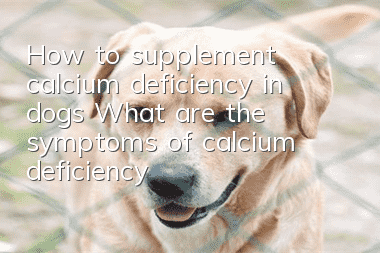How to supplement calcium deficiency in dogs? What are the symptoms of calcium deficiency in dogs?

Which dogs need calcium supplementation
1. Dogs of different breeds and sizes need different calcium supplementation methods at different ages. But no matter what size the puppy is, there is no need to supplement calcium during the lactation period, because they can obtain a large amount of calcium from breast milk. After the puppies are weaned, mini dogs and small dogs fed puppy dog food also need an appropriate amount of calcium supplement. High-quality puppy food will contain an appropriate amount of calcium.
2. If your dog is a large or medium-sized dog, you should pay attention to calcium supplementation when they reach a certain stage of development, because the larger the dog, the faster the growth rate, and the higher the demand for calcium. The larger the amount, the calcium contained in general puppy food is difficult to meet their growth needs. If you are feeding your dog homemade food, you should pay more attention to giving them calcium supplements in time.
3. During the lactation period after giving birth to puppies, the female dog will lose a lot of calcium because she has to feed the puppies with milk. In this case, calcium must be replenished in time, otherwise convulsions, spasms, etc. will occur.
4. If your dog eats animal liver or meat as its main food for a long time, it should also supplement calcium in an appropriate amount. Because this type of food not only contains low calcium, but also contains high concentrations of vitamin A, dogs’ long-term intake of high concentrations of vitamin A can inhibit calcium absorption. Therefore, you should immediately change the habit of feeding animal liver for a long time and replenish it with calcium in time.
Symptoms of calcium deficiency in dogs
If calcium supplementation is insufficient in young dogs, they may develop rib valgus and deformation of the wrist and elbow joints of the forelimbs. Small dogs are prone to "O" shaped legs, while large dogs are prone to "O" shaped legs. In medium-sized dogs, severe deformation of the forelimbs will occur. If not detected in time and treated improperly, it may cause permanent paw splay or lameness. Calcium deficiency in adult dogs generally manifests as irritability, hot flashes, easy fractures, and reluctance to run. Many of the symptoms are similar to humans. Curved bones, O- or
How to improve calcium deficiency
Most of the calcium supplement products on the market are calcium tablets or calcium powder. For puppies, liquid calcium is more suitable, because ordinary calcium tablets can easily damage the gastrointestinal tract. , produces stones, which can get stuck in the throat if you are not careful. Moreover, liquid calcium is easier to absorb than calcium powder and calcium tablets, and it is also very convenient to feed.
For large dogs, in addition to liquid calcium, you can also choose calcium tablets or calcium powder to supplement. But people often say that medicine is three-part poison, and the same is true for dogs. Although these calcium supplement products can give the body the elements it needs, it is still recommended to choose dietary supplements. Generally speaking, food calcium supplementation is safer than drug calcium supplementation. Eating normal food will not cause excessive calcium.
How to supplement calcium on a daily basis
In daily life, you can pay attention to supplementing some dairy products, milk powder, yogurt, cheese for dogs. Be careful to choose pet-specific dairy products to avoid problems.Some dogs are allergic. Sunbathing and outdoor exercise are beneficial to the absorption and utilization of calcium and are one of the safe ways to supplement calcium.
The absorption of calcium is not entirely according to the owner's wishes: as much as you supplement, you will absorb; the more you supplement, the more you will absorb. The amount of calcium absorbed in the gastrointestinal tract mainly depends on the dog's calcium nutritional status at that time, as well as the regulation of activated vitamin D hormone, parathyroid hormone and other substances in the body.
Vitamin D can promote intestinal absorption of calcium. When vitamin D is deficient, no matter how much calcium is supplemented, it cannot be absorbed well. Vitamin D can also inhibit the excretion of calcium by the kidneys and promote the decalcification of old bones.
- What to do if your dog has mouth ulcers? How to treat?
- Why do dogs have so much eye mucus? Why do dogs have yellow and sticky eye mucus?
- How to prevent parvovirus in Huskies? This last method is very useful!
- Why do dogs keep eating grass outside? Is this behavior normal for dogs?
- A dog breed with curly hair. Is a poodle actually a poodle?
- The dog bites the skin but leaves some blood marks. Is it possible to be infected with rabies?
- How do dogs get diabetes? Here’s what you need to pay attention to to avoid diabetes problems
- Can dogs hold their urine? Don’t hold your dog’s urine casually.
- What should you pay attention to if your dog has bad joints? These care measures owners should know
- What are the symptoms of canine distemper and how to treat it? Canine distemper is not an incurable disease



